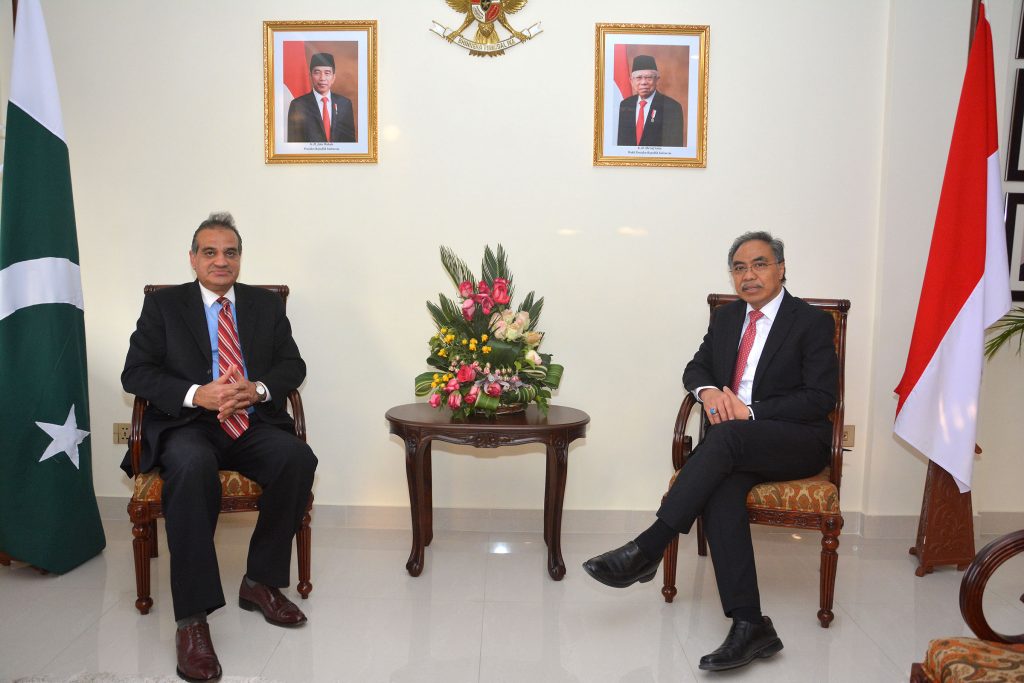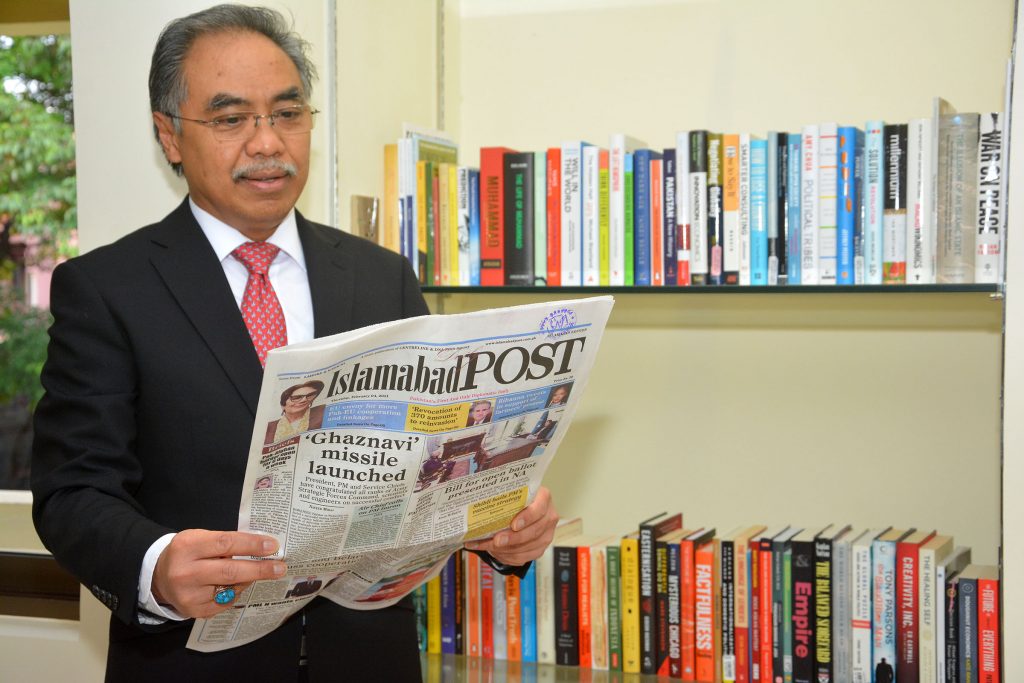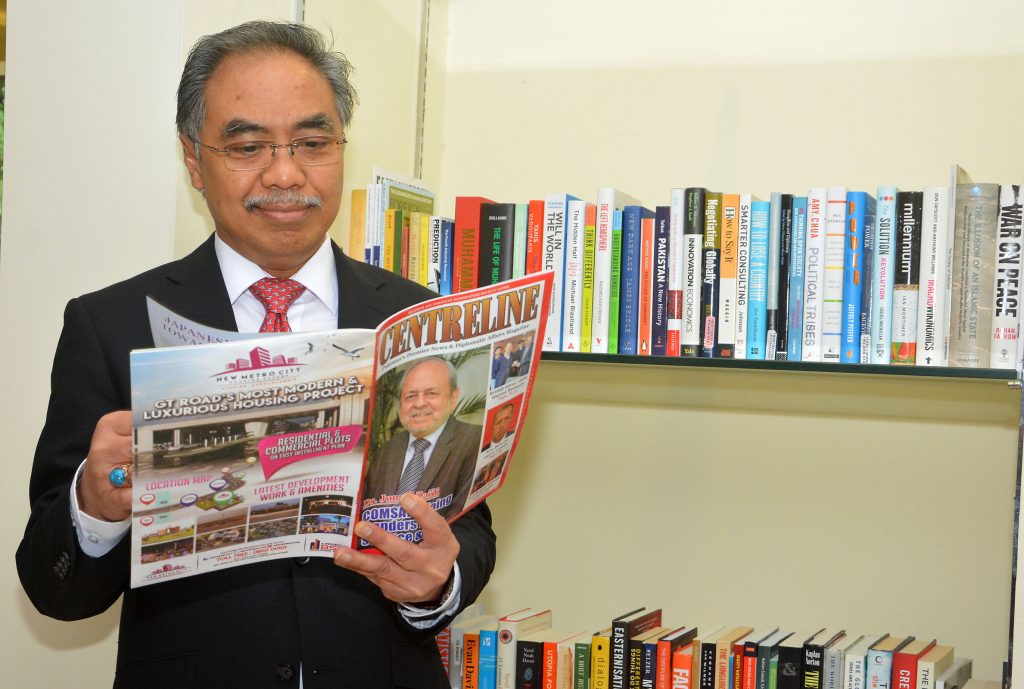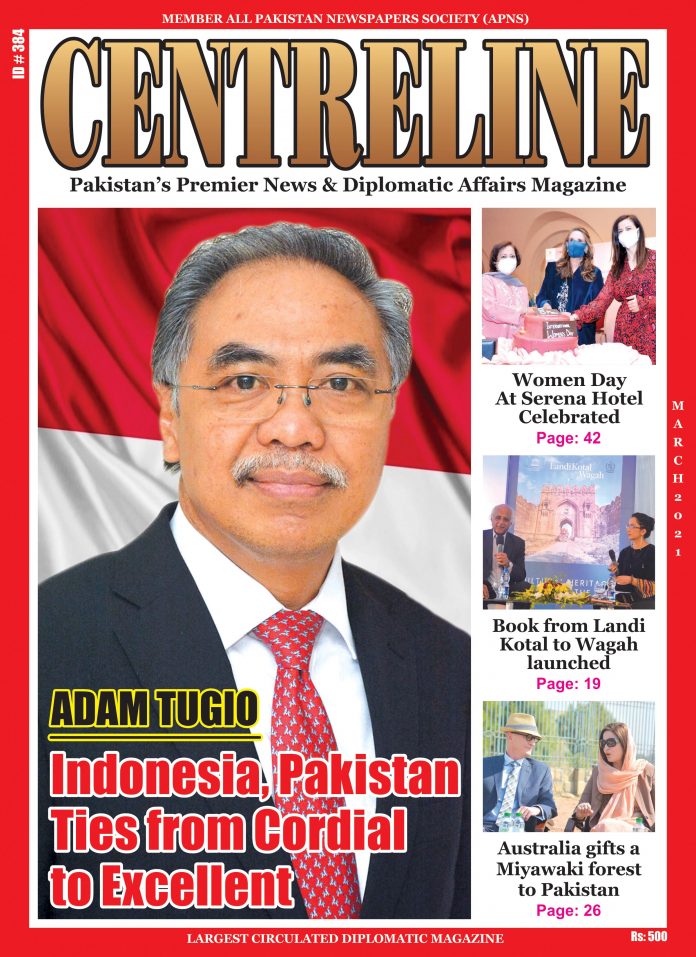Ambassador of Indonesia Adam Tugio talks to CENTRELINE, DNA and Daily Islamabad Post
Ansar Mahmood Bhatti
- Thank you very much for sparing some time for us. Let us welcome you in Pakistan with this hope that bilateral relations will further be strengthened during your tenure as well. Please share with us some details about yourself such as your previous postings etc.
It is an honor for me to serve in this beautiful country of Pakistan, my second home for now. Pakistan is a great country with such rich diverse culture, and friendly people, for which I have developed true affection and admiration.
Speaking of personal experience, I joined the Ministry of Foreign Affairs in 1991 and spent most of my overseas assignments in the United States and in Europe. My early jobs in Jakarta were covering border managements and law of the sea since Indonesia shares maritime areas with 10 countries and land border with 3 countries. Following completion of last assignment in Washington DC in 2013, I oversaw general affairs and procurement of the Ministry for 3 years before moved to cover bilateral relation between Indonesia and countries in the North and Central America.

- How would you describe political and cultural relations between Pakistan and Indonesia and how can these relations be further cemented?
The diplomatic relations between Indonesia and Pakistan are unique and deep-rooted. Soon after the independence of Pakistan in 1947, Indonesia opened its first representative office in Karachi, which was elevated to the status of the Embassy and became fully functional in 1950.
As young nations, both the countries had comparable challenges and went through turbulent phases during their journey towards becoming democracies and emerging economies. The marked feature of our wonderful friendship is trust and mutual respect and understanding based on common religious, cultural and social values. The two countries stand proudly together as two largest Muslim populous countries and emerging economies of creative and talented people.
Indonesia attaches great importance to Pakistan as a reliable partner in South Asia and commends Pakistan’s active role and contribution to maintain regional peace and stability in the region. We strongly consider the geo-economic importance of Pakistan, which serves as a hub to connect to Central Asia, South Asia and Middle East. With total population of 1.95 billion in South Asia and 75 million in Central Asia, there exist a huge potential market for the regions. We should also need to add into this potential, ports infrastructures along 1,046 km coast line of Pakistan that provides access for trade to Middle East and Africa – thus supporting ‘Engage Africa’ economic diplomacy initiative of the Pakistani Government. Various infrastructure developments on land and harbor that being developed by CPEC will strengthen the connectivity not only within Pakistan but also to the wider regions, and will eventually bring benefit for economic development of Pakistan
Our two countries have kept a steady positive momentum in our constructive and cooperative relationship. Especially during the last decade, we have seen substantive growth in our two-way ties in the areas of trade, education, culture and defense. Over the years, the implementation of Preferential Trade Agreement (PTA) and Defense Cooperation Agreement have paved the way for frequent interactions among the toplevel government officials and business community of the two countries. Private sectors have contributed to this end, notably with the active role of Pakistan-Indonesia Business Forum (PIBF) and universities of respective countries in promoting exchange of visits and education linkages.

Our relationship is now becoming stronger, dynamic and more comprehensive. I would especially like to mention here the state visit of President of Indonesia Mr. Joko Widodo to Pakistan in 2018, which opened new avenues of mutually beneficial cooperation. It marked a historic milestone when President Widodo addressed the Joint Session of the Parliament of Pakistan as a special gesture of the democratically elected leader of the largest Muslim populous country and the fourth largest democracy in the world. It was for the second time after President Soekarno, who addressed the highest institution of Pakistan in 1963.
Some positive developments during the last few years are the accomplishment of the 1st Bilateral Political Consultative Forum in 2017, Joint Committee meeting as a follow up of the Defence Cooperation Agreement, relaxation of visa requirements for Pakistani citizens, MoU’s with travel agencies to boost tourism, MoU’s with universities to promote educational linkages, working mechanism of defence cooperation that includes all spectrum of military cooperation (Navy, Army and Air Force). In addition, Policy Planning Dialogue was initiated by Foreign Ministries of both sides, July 2018 in Islamabad.
Indonesia considers Pakistan as an important partner in South Asia and desires enhanced cooperation with Pakistan at the multilateral forums. Pakistan and Indonesia stand by each other at every platform and support each other for common future of peace, progress, prosperity, stability, and development. Both countries highly value their ties and encourage all-around cooperation to further strengthen the fraternal bonds between the two nations. Indonesia and Pakistan also work together in promoting the interest of Ummah in global world, and on global issues of shared concern such as climate change and addressing COVID-19 pandemic.
As regards our cultural ties, I believe that culture has the power to reduce the distance and to unite the people with different background, region and traditions. Happily, the Indonesia-Pakistan friendship has a strong foundation of shared values and similarities in culture. It is true that the similarities are primarily based on the Islamic faith and traditions, but the relationship go even deeper in the history of our two nations as both remained part of the great Buddhist and Hindu civilizations and later their population gradually converted to Islam. It is important therefore, that we constantly nurture these cultural bonds which are greatly valued by our peoples. The promotion of cultural ties is an important part of our efforts to strengthen the people-to-people contact to further foster the bonds of friendship.

Pakistan and Indonesia are also desirous to increase cooperation in the fields of education, science & technology. To foster cultural & academic linkages, the Embassy continues to engage the Pakistani educational and cultural institutions, students and other segments of the civil society. Education is one of the areas that offer some great potential for the bilateral cooperation to benefit from and bring the people of the two countries even closer.
In recent years, academic cooperation has seen some significant improvement as number of MoU’s on academic cooperation between 10 Indonesian universities with equal number of university partners in Pakistan had been signed and more were under process or consideration.
Following the success of the Indonesian government scholarships of KNB and Dharmasiswa in Pakistan, there has been growing interest among the Pakistani students to pursue higher education programs in Indonesia. More recently, master and doctoral level partially funded scholarships offered by some Indonesian universities have also received encouraging response from the Pakistani students.Therefore, in view of the Pakistani student’s interest, there is opportunity for the universities of the two countries to capitalize and lay foundation for a solid academic cooperation.
Another attractive area of cooperation with big potential is tourism. It is generally about leisure and pleasure but it also promotes cultural exchange and provides opportunity to people of various cultures to meet and understand each other. It also brings people of the similar taste and profession together and opens up windows of many opportunities.
These days, tourism is one of the fastest growing industries in the world. In addition to the opportunities for recreation, tourism industry has emerged as a big source to generate employment opportunities, grow service sector and help earn foreign exchange. Hence, tourism spurs the overall economic growth worldwide.
Despite very cordial and brotherly ties and having the great existing tourism potential that our two countries offer, it is important to find why the two-way tourists’ traffic is almost limited. Recent statistics of 2019 suggests that tourist arrival in Indonesia from Pakistan has remained very low with only 14,000 tourists from Pakistan.
Pakistan on the other hand is an absolutely stunning country blessed with famous mountain peaks, beautiful green valleys, Mughal architecture, Ghandara art and civilization, religious tourism sites and deserts filled with remnants of ancient civilization. Both the countries can share experiences to develop infrastructure and hospitality industry to facilitate tourism.
- Business ties between the two countries are constantly on the move. COVID has though impacted this momentum, yet resolve and will is always there to take business ties to new heights. Your comments please.
I believe that in the area of bilateral trade, we are now moving in the right direction by advancing our bilateral trade partnership through providing access and opportunities to our corporate sectors for a sustained economic growth. The real trade potential of our corporate sector is far above than the trade figures and what we need is more concerted efforts to materialize this potential.
Following the implementation of the Indonesia-Pakistan Preferential Trade Agreement in 2013, bilateral trade figures have reached to historic high. Since then, the relations of the two countries in the economic sector are becoming stronger and stronger while the bilateral trade is also increasing on a year-on-year basis. It is also a very encouraging sign that there is a new wave of interest in the business community of both the countries to establish long-term trade relations.For further increase of bilateral trade volume, we need more promotions and interactions between the business community though the Chambers of Commerce and Industry, participation in trade Expo, market survey to explore the trade opportunities, exchange of trade data and country information with facts and figures to support the momentum of growth.
The outbreak of coronavirus disease indeed has severely affected the global economy, including Indonesia and Pakistan. In this kind of pandemic situation Indonesia and Pakistan must work together for the sustainable trade relations between both countries.
One of the efforts that can be done is by intensifying communications and consultations between stakeholders of both countries. In addition, business activities such as exhibitions and business forums, etc. also can still be done in a virtual way to further explore potential economic cooperation between both sides. Those strategies are believed could uplift business, economic and other aspects of the bilateral ties in the time of pandemic, like today. The volume of bilateral trade between the two countries in 2019 was USD 2.3 billion. Despite the pandemic, the whole 2020’s bilateral trade volume from January – November 2020 remained US$.2.2b with a slight correction.
With a large population and demographic bonus, both Indonesia and Pakistan have acknowledged that there is considerable untapped potential to expand trade, and to improve the trade imbalance under the mechanism of the trade agreement between the two countries. This constitutes priority of my assignment in Pakistan.
In order to meet those objectives, we are currently in the process of the negotiation on upgrading the PTA to a Trade-in-Goods Agreement (TIGA). The first negotiation was conducted in 2019 in Islamabad. Further negotiations are scheduled to be carried out soon.
- COVID-19 as we know has affected all and sundry. Please share Indonesian government steps to deal with this pandemic and when do you think Indonesia shall be open for international visitors?
It is universally agreed that Covid-19 pandemic is an extraordinary situation so that the response must also be extraordinary, both at the national and global levels. This pandemic which was initially viewed as a health issue, has been then developed into an issue that has a deep global impact on socio-economic aspects. Globalization itself has a role in the spread of COVID-19, where the movement of people becomes limitless and results in uncontrolled spread, and affected almost all over the world, including Indonesia.
For Indonesia the first impact was on the household consumption or purchasing power, which is the 60 percent support for the economy, fall deeply. On the other hand, the pandemic also causes prolonged uncertainty so that investment weakens and has implications for the cessation of business. The third impact where the entire world is experiencing a weakening economy, causing commodity prices to fall and Indonesian exports to several countries also declined deeply.
Anticipating the worse impact, Indonesia has taken several strategic steps both at the national and global levels by developing National Economic Recovery Program (NERP). In sum, the strategy addresses the health emergency, and simultaneously allocating safety net for social protection program, and by providing stimulus for SME industries and to boost domestic consumption.
The government at national levelprovides NERP a stimulus up to Rp. 700 Trillion (approx. USD 48 billion), allocated to healthcare sectors, strengthening social safety nets, and as an incentive for micro, small and medium businesses. The other part of the stimulus is targeted for business incentives, which include tax incentives, to support ministries and regional administrations, and also to stimulus measures for state-owned enterprises (SOEs) and labor-intensive businesses. The bigger allocation for corporations also allocated as working capital loans for labor-intensive businesses. Part of this fund was also allocated to support healthcare industry, such as production of medical equipment, masks, including vaccines. On vaccine itself, Indonesia is now developing a homegrown vaccine namely ‘Merah Putih’ vaccine – representing the country’s red and white flag – that expected to start clinical trial by end of this year.
Like other countries, Indonesia is also enforcing health protocol namely ‘3M’. The 3M stands for “menggunakan masker” (mask-wearing), “mencucitangan” (hand-washing) and “menjagajarak” (social-distancing). Simultaneously, we use ‘3T’ – Tract, Tracing and Treatment. The later refers to building pocket of small isolation and health centers to prevent spreading of corona virus to wider regions. Lockdown policy was also enacted in different scales including Large-scale Social Restriction (PSBB) policy from early April 2020 and the government periodically reviews this policy, taking into account the latest development.
Indonesia is fully aware that ‘no one is safe until everyone is safe’.Therefore, at global levelIndonesia along with UN is ensuring that every country has rapid, fair and equitable access to COVID-19 vaccines once safe and effective vaccines become licensed. Recently Indonesian Foreign Minister, RetnoMarsudi was appointed as Co-Chair of the COVAX AMC Engagement Group, initiated by the World Health Organization (WHO) and Vaccine Alliance (GAVI). Along with Ethiopian Health Minister and Canadian Minister of International Development, Foreign Minister Marsudi will lead the COVID-19 vaccine procurement and distribution program for 92 COVAX AMC member countries.
In the United Nations, Indonesia initiated a resolution on International cooperation to address challenges faced by seafarers as a result of the COVID-19 pandemic to support global supply chains. The resolution secured co-sponsorships from more than 70 countries and was the first General Assembly resolution that recognized the contribution of seafarers to global supply chains.
The resolution is an important breakthrough in galvanizing international attention to maritime safety issues, particularly the well-being of seafarers in the midst of the Covid-19 pandemic. Seafarers around the world face grave challenges as Covid-19-related restrictions render crew changes and repatriation of seafarers difficult. It is hoped that the resolution will encourage international cooperation in facilitating the change of crew members, an important factor in seaborne trade and the global supply chain.
In terms of availability of medical equipment around the world, Indonesia also calls on the importance of creating a voluntary list of manufactures related to personal health and medical devices. Since at the beginning of the pandemic, many countries had difficulty getting materials for these devices so that a voluntary list should be created to facilitate access for countries in need.
This step would allow state and business sector to be able to meet the needs of their countries and on a wider scale to respond to the COVID-19 pandemic which is sweeping across the globe.
Indonesia is also stimulating a travel corridor arrangement for Southeast Asian countries, by which the countries that are successfully containing the outbreak can open their borders to each other to allow free movement of essential business travelers within the bubble. Currently due to the recent development of the COVID-19 situation and the new variant of the COVID-19 Indonesia temporary conducts entry restriction into the territory of the country that has been extended until 8 February 2021.
- Indonesia is an important ASEAN country and Pakistan wishes to deepen its cooperation with ASEAN countries through its Look East policy. How do you view this approach?
ASEAN is a dynamic organization of 10 members, spanning an area of 4.4 million square kilometers, a population of over 649 million, and a GDP exceeding US$2.9 trillion or the fifth largest economy in the world. ASEAN and Pakistan have great potential for cooperation in various sectors. Pakistan’s total bilateral trade with ASEAN is over $7 billion while the trade between Indonesia-Pakistan reached up to $ 2.3 billion in 2020. It suggests that there is huge scope for Pakistan to scale up its economic engagement with ASEAN through its member-states.
Indonesia along with other ASEAN members continue to support close friendly ties with Pakistan as a Sectoral Dialogue Partner and an active member of the ASEAN Regional Forum (ARF). Indonesia supports Pakistan when it was accorded the sectoral dialogue status of ASEAN at the 26th ASEAN Ministerial Meeting on 23 July 1993. Indonesia also supports Pakistan to be full dialogue partner of ASEAN. Due to moratorium the process of Full Dialogue Partner is still pending.Despite this, Indonesia encourages Pakistan’s collaboration with ASEAN region particularly in the areas of trade & investment, education, human resources development and tourism which could bring huge economic benefits to Pakistan.
ASEAN and Pakistan have many similarities including strong cultural and religious affinity. There are approximately 242 million Muslims which are about 42% of the entire population, with majorities in Brunei, Indonesia and Malaysia as well Southern Thailand and parts of Mindanao in the Philippines respectively. Those similarities serve as a reservoir of goodwill in relation between ASEAN and Pakistan. However, there are potentials still untapped and many ways to enhance the relation and the cooperation between ASEAN and Pakistan including the dialogues with the think tanks of both countries.
Indonesia highly values Pakistan’s ‘Vision East Asia’ policy. The implementation of this policy, we believe will contribute to further strengthen political, economic and cultural ties with ASEAN and its member states. To this end, Pakistan’s outreach to ASEAN needs to be deepened at political level among other through exchange of high-level visits and those of business community to make their presence felt.
- Other
Bilateral relations between the two countries are already quite excellent nowadays. So far there has been a mechanism at the technical level, bilateral consultation forums and policy dialogue, defense cooperation dialogue and Preferential Trade Agreement (PTA). As an effort to strengthen bilateral relations we need to encourage a more structured dialogue at ministerial level to provide future directive to attain mutually beneficial objectives.
In addition, high intensity of interaction between high-ranking officials and parliamentary cooperation are necessary to further develop ties. Of equal importance is cementing of cultural bridge through two-way technical and socio-cultural cooperation, which will certainly encourage people to people contact among others. Particular reference should be made to the participation of millennial, whom we invest our efforts to build more prosperous Indonesia and Pakistan.
***











